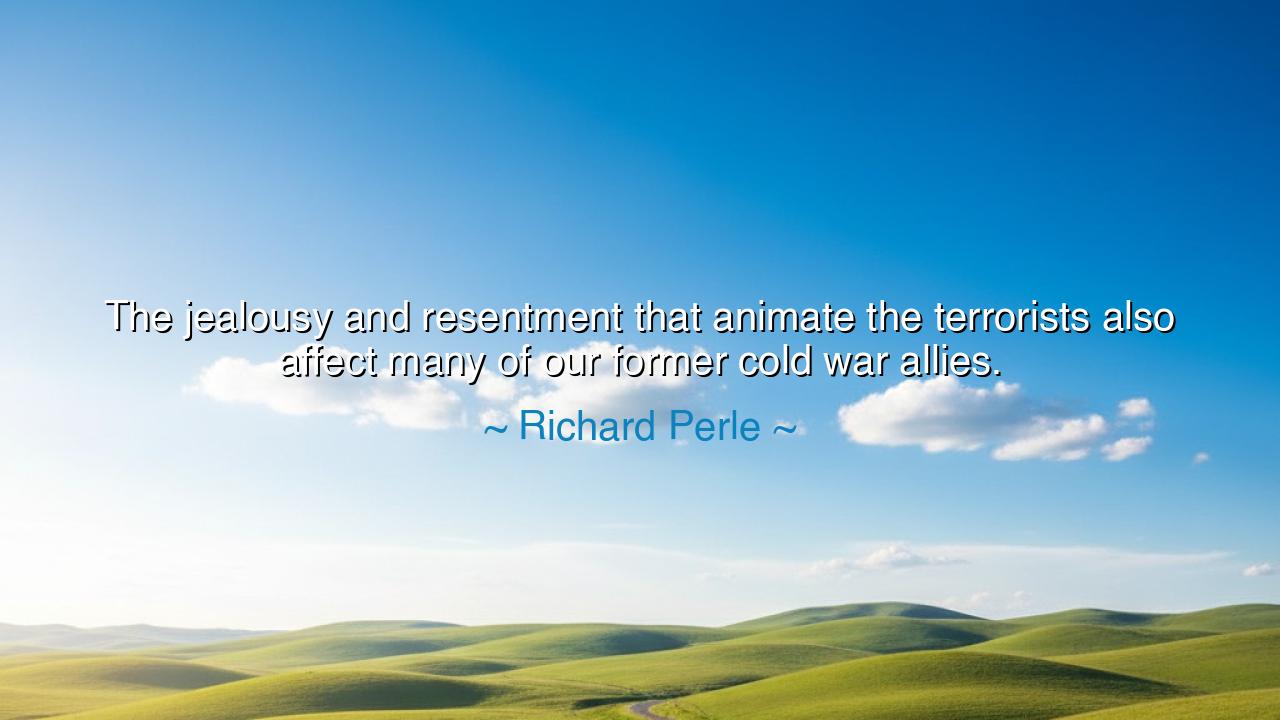
The jealousy and resentment that animate the terrorists also
The jealousy and resentment that animate the terrorists also affect many of our former cold war allies.






"The jealousy and resentment that animate the terrorists also affect many of our former cold war allies." In these grave and discerning words, Richard Perle, a statesman of the modern era, speaks of the hidden emotions that shape nations as much as they do men. His voice echoes with the wisdom of one who has looked deeply into the nature of power, pride, and envy. Beneath the political surface of this quote lies a timeless truth: that the forces which move individuals—the desire for recognition, the sting of humiliation, the envy of another’s success—also move empires. For the hearts of nations are but the hearts of men multiplied.
Perle, who served as an influential figure in American foreign policy during the latter half of the twentieth century, uttered these words in the wake of a world transformed. The Cold War had ended, and the mighty confrontation between the United States and the Soviet Union had given way to a new era of uncertainty. Many nations that had once been bound to America by shared fear of communism now looked upon her not as a partner but as a rival. The balance of power had shifted, and with it, the balance of emotion. Perle observed that jealousy and resentment, the same dark fires that drove terrorists to hatred, were also stirring in the hearts of those who had once stood beside America. He spoke not only of politics, but of human nature itself—its frailty, its pride, and its unquenchable hunger for dignity.
For even alliances, like friendships, are rarely free from envy. During the Cold War, America had been both protector and giant—a source of wealth, influence, and technological wonder. Many nations prospered under her shelter, yet dependence breeds unease, and gratitude often curdles into jealousy. When the Cold War ended, and the threat that had united them disappeared, old emotions reawakened. Some nations began to resent their former benefactor, seeing in her power a reminder of their own weakness. The same impulse that drives an envious man to resent his neighbor’s fortune drove whole nations to turn cold toward their former ally. Thus, the cycle of jealousy and resentment, which Perle described, was not born in war but in peace.
This truth is not new. History, that great mirror of the soul, reflects it endlessly. Consider the story of Rome—the greatest power of its age. When Carthage was destroyed, and the Mediterranean became a Roman sea, the very allies who had once fought beside Rome began to fear her might. The proud Greeks, the cunning Egyptians, and the independent Gauls all turned, in time, from admiration to envy, from cooperation to rebellion. Rome, like America centuries later, found that victory over her enemies did not protect her from the resentment of her friends. Thus, Perle’s wisdom is the wisdom of the ancients reborn: that power not tempered by humility will always awaken jealousy, even among those who once shared its cause.
Yet there is another layer to his words—one that pierces even deeper. Perle reminds us that jealousy and resentment are not only the emotions of the weak; they are the seeds of destruction for all who harbor them. Whether in men or nations, they breed division, mistrust, and ultimately violence. The terrorist, consumed by hatred of the powerful, is driven by the same dark flame that can smolder in the hearts of allies who feel overshadowed. This recognition demands wisdom and restraint from those who wield power. For the wise ruler, like the wise man, must learn not only to conquer enemies but to heal envy with justice, to temper victory with humility, and to convert resentment into respect.
In every age, the same lesson reemerges: jealousy is the mother of betrayal. It was jealousy that turned Cain against Abel, that drove Brutus to the dagger, that made Napoleon’s Europe turn upon itself. And so too in our modern world, nations that once stood united may be divided not by ideology, but by emotion—by the ancient wound of envy. Perle’s warning, therefore, is not to condemn others, but to caution all who stand in power: beware not only the weapons of your enemies, but the hearts of your friends.
Let this be the teaching drawn from his insight: power must walk humbly, and strength must listen well. If you rise in life—whether as a leader, a creator, or a nation—remember that your light will cast shadows in the hearts of others. Do not despise them, but understand them. The wise do not answer jealousy with pride, nor resentment with disdain. Instead, they seek to uplift, to share, to lead without dominating. For in doing so, they transform rivalry into partnership, and envy into admiration. Thus may the world, and the individual soul, find peace—not through conquest, but through the quiet mastery of understanding.
In the end, Richard Perle’s words are both political and eternal: a reminder that no empire, no friendship, and no human bond can endure if it forgets the delicate art of empathy. The jealous heart destroys both itself and the object of its envy. But the heart that understands—strong, humble, and wise—builds not only alliances, but civilizations that last.






AAdministratorAdministrator
Welcome, honored guests. Please leave a comment, we will respond soon